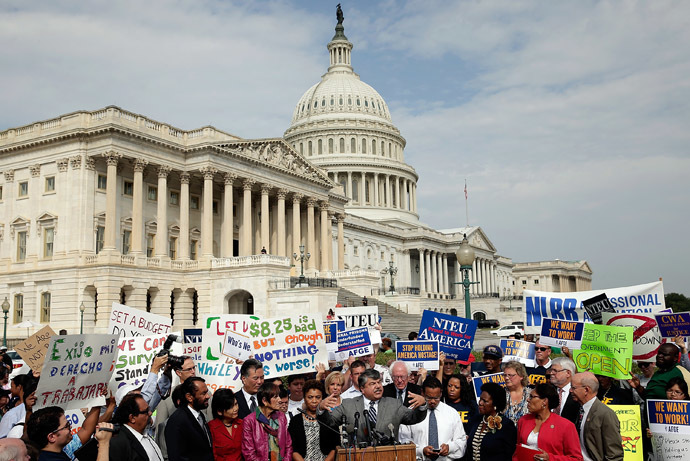A Senate deal to end the government shutdown and avert the US from defaulting on its debt might be in sight, as both Republican and Democrat leaders share an optimistic outlook, following an intense day of talks.
Senate Majority Leader Harry Reid, a Democrat, and his Republican
counterpart, Mitch McConnell, hinted on Monday they were nearing
a deal that would resolve the political stalemate, end the
two-week-long government shutdown and extend the Treasury
Department’s borrowing authority.
According to the leaked Senate deal, the debt ceiling would be
raised to a level necessary to allow the country to keep on
borrowing till February 2014. In case the lawmakers do not manage
to strike a deal, the US might be only two days away from
financial collapse. October 17 is when, according to US Treasury
Department estimates, the country will reach its $16.7 trillion
borrowing limit.
As the financial D-Day nears, the world is on alert. It’s been
estimated that 16.8-trillion dollars in securities held by
investors is at risk.
“We’ve made tremendous progress”, Reid said. “We are not there yet, but tremendous progress. And everyone just needs to be patient. Perhaps tomorrow will be a bright day.”
McConnell, usually a fierce critic of Reid, agreed with his
counterpart this time.
"I share his optimism that we're going to get a result that
will be acceptable to both sides," he said.
The looming Senate deal will only see some minor changes to
President Obama’s landmark healthcare law. This has already
caused mixed reactions among conservative Republicans, who wanted
to see a major overhaul for the bill.
Some, like Senator Rand Paul of Kentucky, believe resolving the
government deadlock outweighs all other concerns. “We need to
get an agreement and open the government back up,” he said,
as cited by The Washington Post.
There are however, fierce hardliners within GOP, who are not
ready to compromise. "No deal is better than a bad deal,"
Representative Joe Barton of Texas said, suggesting that even if
the deal is struck in the Senate, the House might not follow
suit.
This tough stance might well cost the party supporters, as 74
percent of Americans disapprove of the way GOP has handled the
standoff, according to a Washington Post/ABC News poll released
on Monday. The same poll shows a 53 percent disapproval rating
for President Obama.

Meanwhile, the self-inflicted shutdown has been costing the US an
estimated $160 million a day.
The government has run out of cash to pay some 800,000 federal
workers during the deadlock. Hundreds of patients cannot be
accepted for treatment, including cancer patients, as 75% of
staff are not working because of the shutdown.
Veterans are enraged about war memorials being closed for the same reason, and over the past two weeks they have regularly staged protests, urging the government to do their job and get the budget passed.
The Executive Director at the American Jobs Alliance, Curtis
Ellis, believes it’s high time for the politicians to put their
ambitions aside to avert the looming crisis.
“It could have quite a catastrophic effect”, Curtis told
RT. “We are talking about global economic financial chaos. I
prefer not to play roulette like that. The depths of human folly
are fathomless, but we are talking about politicians and with
politicians it’s even worse. I do like the fact that we have
democracy here and a back and forth between branches of
government, but I do hope that it’s principals that they are
standing on, not ego and not a desire to save face”.
Americans are growing ever more impatient for the crisis to be
resolved. A Reuters/IPSOS poll released on Tuesday shows growing
concern for the debt ceiling issue, as only 25 percent believe
it’s “overblown.”
And the concern has long spilt beyond the US. The fact that the
United States has again put the global economy on the brink of
another crisis is not doing the country’s international image any
favors, according to economist and former British treasury
official, Neil Mackinnon.
“I think these periodic crises undermine confidence in US
economic policy, they undermine confidence in the US dollar as
the world’s leading reserve currency,” Mackinnon told RT.
“And if this dysfunction continues then over time
international investors will be looking for a reform of the
international monetary system, and they’ll be challenging the
role of the dollar as the leading reserve currency."
Lack of trust is already in evidence. The loudest anti-American
warning has come from China, the biggest US creditor. An
editorial published by the Chinese state-owned press agency,
Xinhua, called on Monday for de-Americanization of the world.
